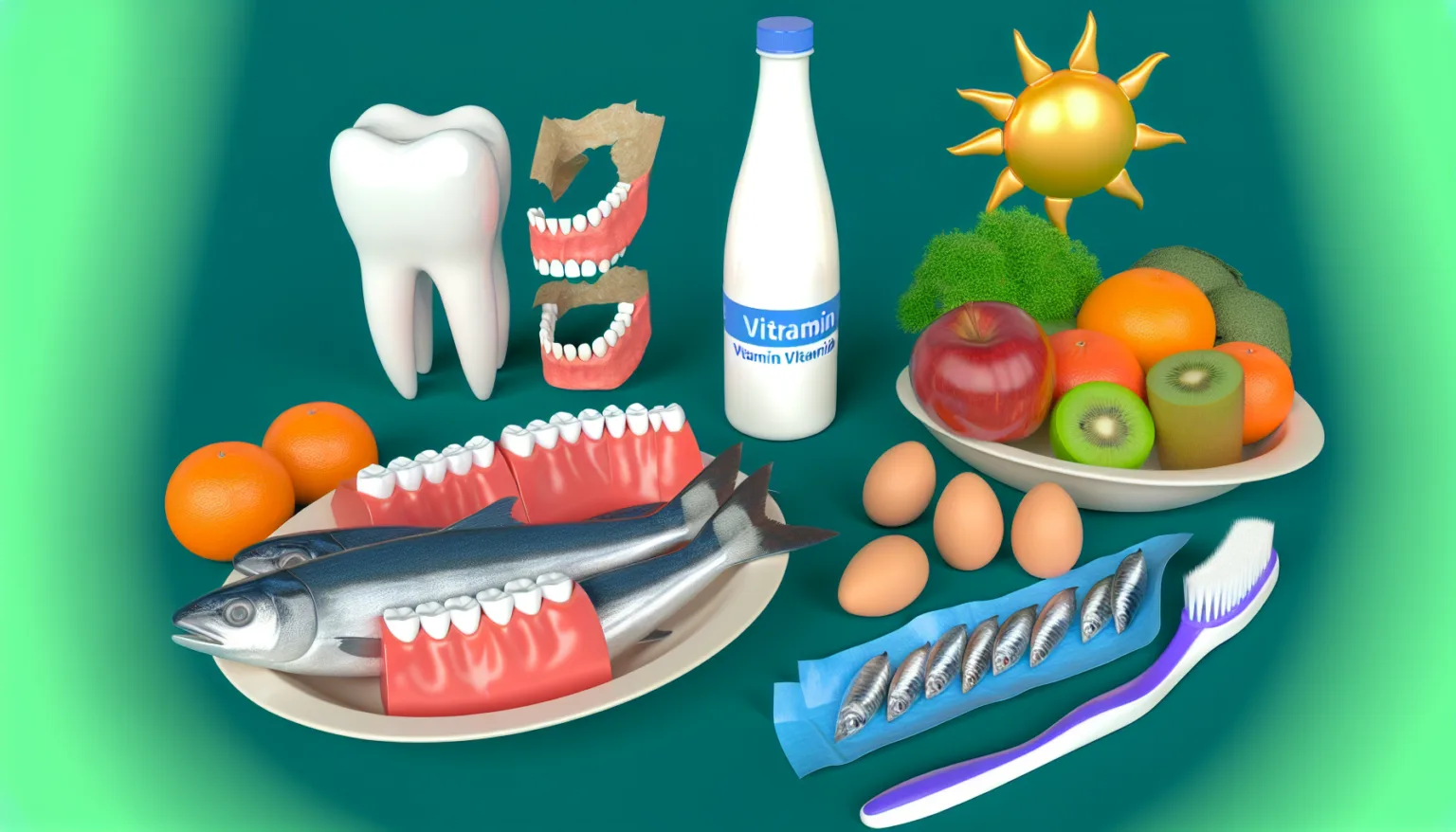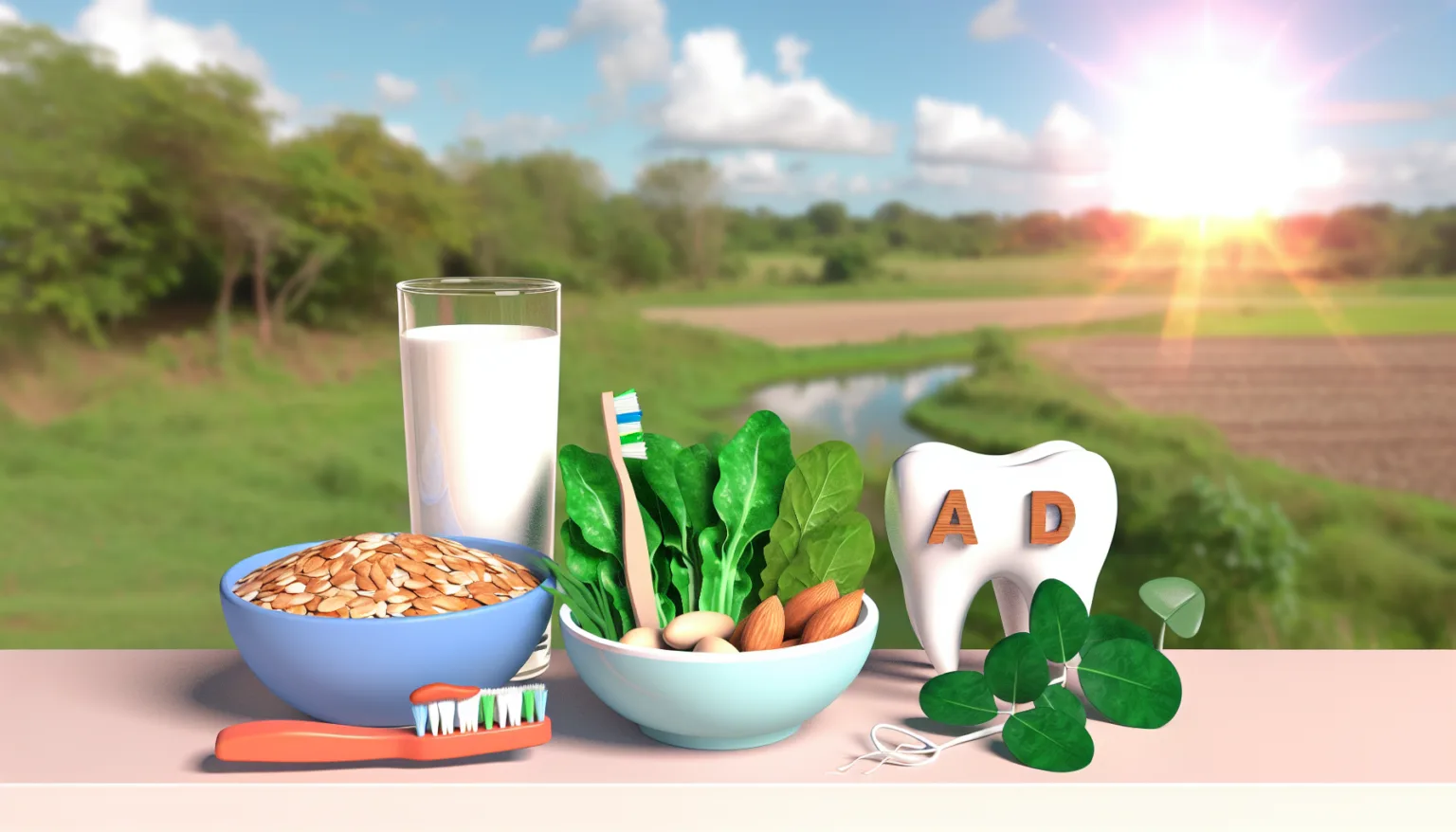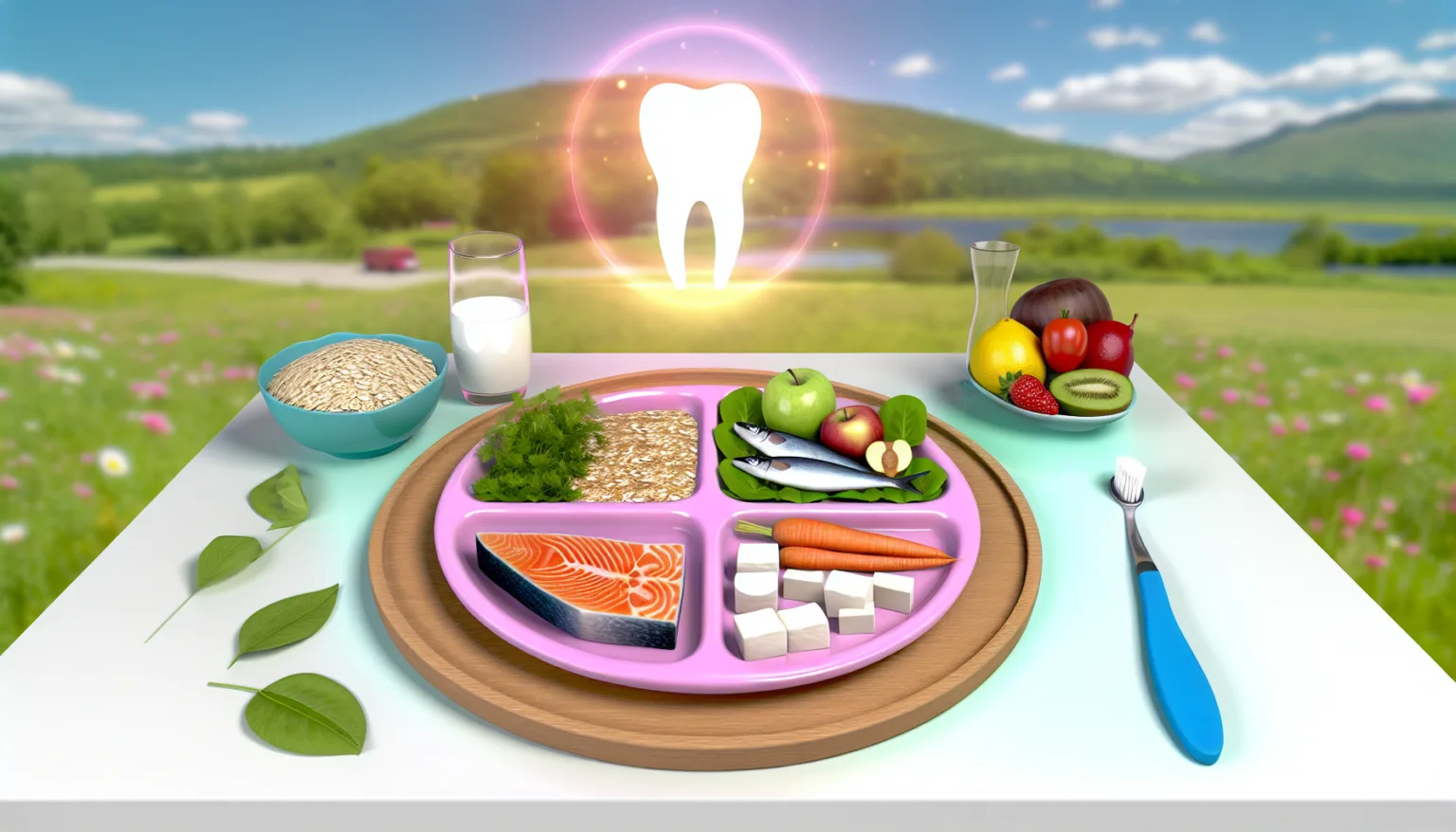Nutrition’s Impact on Dental Health

Introduction
Welcome to a deep dive into the fascinating world of nutrition and oral health. While most of us are aware of the basic tenets of dental care—brushing, flossing, and avoiding too much sugar—the impact of our overall diet on our dental wellness is often less discussed. Yet, the foods we eat and the nutrients they contain play a critical role in maintaining the health of our teeth and gums. This article aims to broaden your understanding beyond the simplistic view of sugar as the main dietary villain, exploring how various nutrients, nutritional habits, and food types influence oral health.
Table of Contents
The Underrated Role of Vitamins and Minerals in Dental Health
When discussing oral health, we often think of brushing, flossing, and avoiding sugary treats. However, another crucial player in gum and tooth wellness is your diet, specifically the vitamins and minerals it contains. Yes, what we eat goes beyond mere fuel for our bodies; it can play a vital role in maintaining or even improving our dental health.
Vital Vitamins and Minerals for Your Teeth
- Calcium is excellent for your bones and essential for your teeth. Calcium helps harden enamel and strengthen your jawbone, and it is a frontline defense against tooth decay and gum disease.
- Vitamin D: Often called the “sunshine vitamin,” Vitamin D boosts mineral density in bones and teeth and helps your body absorb calcium more effectively.
- Phosphorus: Found in eggs, fish, and meat, this mineral works with calcium and Vitamin D to protect and rebuild tooth enamel.
- Vitamin C: Its antioxidant properties help with gum health, reducing inflammation and bolstering the soft tissues in your mouth that keep your teeth in place.
These nutrients can shield your teeth and gums from disease and decay, proving that a balanced diet is fundamental to oral health.
Bridging Nutrition and Oral Care: A Real-Life Connection
To understand how stark the relationship between diet and dental health can be, one must look no further than the detrimental effects of nutrient deficiencies. For instance, lacking Vitamin C can lead to scurvy, a disease marked by swollen, bleeding gums and loose teeth. Conversely, ensuring an intake rich in these elements can prevent dental issues and effectively support oral health recovery and maintenance.
One doesn’t need to embark on this journey alone. Dental Brothers‘ comprehensive approach ensures patients understand the full spectrum of maintaining oral health, including the importance of a nutrient-rich diet complemented by professional dental care.
Yet, the crucial understanding that holistic health, including dental wellness, starts on your plate cannot be understated. To delve deeper into how vitamins and minerals affect oral health, including their recommended dietary sources, the National Institute of Dental and Craniofacial Research offers a treasure trove of information. It highlights that the path to a radiant smile is more complex than we might have thought.
Exploring the Oral Benefits of a Protein-Rich Diet
While vitamins and minerals are often the focus of discussions about diet and oral health, another essential nutrient, protein, plays a crucial role in maintaining and enhancing dental wellness. Proteins, the building blocks of life, are fundamental for overall health and the strength and resilience of our teeth and gums.
Protein’s Power in Your Mouth
- Tooth Structure: Proteins contribute to the structural integrity of teeth. Collagen, a protein found in connective tissues, helps hold teeth within the jawbone, effectively supporting their stability.
- Gum Health: Adequate protein intake is vital for healthy gums, which act as a protective barrier for teeth. Proteins also help regenerate gum tissue and fight periodontal diseases.
- Healing Powers: Proteins are key to the mouth’s healing process after dental procedures or injury. They aid in tissue repair and can significantly speed up the recovery period.
The ample benefits of a protein-rich diet extend to our mouths, showcasing protein as an unsung hero in dental health. Notably, for individuals considering dental restoration options, such as dental implants, protein’s healing and regenerative properties can play a pivotal role in the success of such procedures.
Optimal Sources of Protein for Oral Health
Understanding the importance of protein is one thing, but integrating it effectively into your diet is another. Lean meats, fish, beans, and dairy products are excellent sources of high-quality protein; for vegetarians or those looking to diversify their protein intake, nuts, seeds, and legumes offer substantial amounts of this essential nutrient. Choosing various protein sources can ensure you receive all the amino acids your body needs to support oral health and overall well-being.
Beyond maintaining oral health through diet, managing dental anxiety is a common concern that can deter people from seeking necessary dental care. Resources like self-care tips can address this issue and empower individuals to confidently take control of their oral health journey.
In summary, incorporating a balanced amount of protein into your daily diet is beneficial for your general health and pivotal for maintaining healthy teeth and gums. It’s a simple yet effective way to support your oral health naturally.
Antioxidants: The Hidden Heroes of Oral Health
In the quest for optimal oral health, antioxidants are often the unsung heroes that deserve a spotlight. They combat oxidative stress that can damage cells throughout the body and offer a protective shield for our mouth, teeth, and gums against various dental problems.
Why Antioxidants are Crucial for Your Mouth
- Combatting Gum Inflammation: Antioxidants such as Vitamin C and E can reduce inflammation in the gums, helping to prevent or manage conditions like periodontal disease.
- Strengthening Oral Defenses: They help fortify the mouth’s natural defenses against harmful bacteria, potentially reducing the risk of cavities and infections.
- Supporting Healing: Antioxidants play a significant role in healing after dental procedures or injuries, promoting faster recovery and regeneration of oral tissues.
Embedding a diet rich in antioxidants is a proactive approach to maintaining oral health alongside regular dental care practices. Foods such as berries, nuts, green leafy vegetables, and fruits are excellent sources of these vital compounds. Making these foods a regular diet can contribute to stronger, healthier teeth and gums.
Antioxidants and Professional Dental Care
While a diet rich in antioxidants provides a strong foundation for oral health, supporting these efforts with professional dental care is important. For those considering enhancing their smile and oral health through cosmetic procedures, understanding the benefits and options, such as dental sedation in Mesa, can make the experience comfortable and anxiety-free.
Embracing antioxidants in our daily diet is a simple yet impactful way to protect and enhance oral health. It provides another tool in our arsenal against dental diseases and ensures that our smile remains bright and healthy for years.
The Sour Side: How Dietary Acids Affect Your Teeth
Acidic foods and drinks are staples in many diets, but their effects on oral health are often overlooked. The acids in these dietary choices can profoundly impact the enamel of your teeth, leading to erosion, sensitivity, and even cavities. Understanding the sour side of your diet is crucial for maintaining a healthy mouth.
The Impact of Dietary Acids on Enamel
- Enamel Erosion: Acidic foods and beverages can wear away the protective enamel on your teeth, leaving them more vulnerable to decay.
- Teeth Sensitivity: As enamel erodes, teeth become increasingly sensitive to temperature changes and certain foods, causing discomfort.
- Risk of Cavities: Teens are more susceptible to cavities and further damage with weakened enamel.
To safeguard your teeth against these effects, it’s essential to be mindful of your diet’s acidic content. Foods and drinks like citrus fruits, soda, and even health-focused choices like sports drinks and vinegar-based dressings can be high in acids. Moderating these items and practicing good oral hygiene, including regular brushing and flossing, can help mitigate their impacts.
Counteracting Acidic Damage
While eliminating all acidic foods from your diet isn’t necessary or realistic, there are steps you can take to protect your teeth. Drinking water or rinsing your mouth after consuming acidic foods can help neutralize the acids. Chewing sugar-free gum can also stimulate saliva production, which naturally defends against enamel erosion by neutralizing acids and remineralizing teeth. Additionally, using a straw when drinking acidic beverages can help minimize their contact with your teeth.
Despite best efforts at home, regular check-ups and cleanings are paramount in catching and addressing any damage early. For those experiencing sensitivity or concerned about enamel erosion, visiting the dentist can provide personalized advice and treatment options tailored to your needs.
The American Dental Association’s Mouth Healthy site offers a wealth of resources for further information on dietary acids and their effect on oral health. Understanding and moderating acidic foods in your diet can actively preserve your enamel and maintain a healthy, vibrant smile.
Building Blocks of a Tooth-Friendly Diet: Calcium and Beyond
A cornerstone of good oral health lies in regular brushing and flossing and the building blocks of our diet. Calcium stands out among these nutritional elements due to its significant benefits for teeth and bones. However, focusing solely on calcium might mean missing out on the synergy created when combined with other crucial nutrients. Let’s explore how to build a tooth-friendly diet that goes beyond just calcium.
Critical Nutrients for Strong Teeth
- Calcium: It’s well-known that calcium strengthens teeth and bones. Dairy products, almonds, and leafy green vegetables are excellent sources.
- Vitamin D is essential for calcium absorption. It can be obtained from sunlight exposure, fatty fish, and fortified foods.
- Phosphorus: Found in eggs, fish, and poultry, phosphorus works alongside calcium to help rebuild tooth enamel.
- Magnesium: This mineral helps with calcium absorption and is found in whole grains, nuts, and green vegetables.
Adopting a diet rich in these nutrients ensures a well-rounded approach to oral health, promoting strong, healthy teeth and reducing the risk of cavities and enamel erosion. Supplementing these essential nutrients might be necessary to maintain optimal oral health for those with dietary restrictions or preferences. Consulting with a healthcare provider or a nutritionist can help tailor dietary choices to meet individual needs and health goals.
Combining Diet and Dental Care for Optimal Oral Health
While a nutrient-rich diet lays a solid foundation for oral health, it should go hand in hand with diligent dental care practices. Regular dental check-ups, brushing, and flossing are indispensable for catching potential issues early and keeping your mouth healthy. While maintaining this balance, addressing dental anxieties that might prevent you from seeking necessary care is essential. Unfortunately, all the initially provided relevant internal links have been utilized in previous sections, emphasizing the comprehensive nature of our discussions on dental health thus far.
In conclusion, building a tooth-friendly diet involves a balanced intake of essential nutrients that support oral health beyond calcium alone. Combining these dietary efforts with regular dental care ensures the best defense against tooth decay and gum disease, leading to a lasting, healthy smile. For more detailed guidance on creating a balanced diet for dental health, consider exploring resources from reputable organizations such as the USDA’s MyPlate, which offers personalized eating plans and dietary recommendations.
Crafting Your Plate: A Guide to a Balanced Diet for Optimal Oral Health
The significance of a balanced diet cannot be overstated in the journey toward maintaining a healthy smile. A well-crafted plate fuels the body and provides nutrients to prevent dental diseases and promote oral wellness. Understanding how to balance your diet effectively is vital to achieving the best oral health outcomes.
Components of a Tooth-Friendly Diet
- Lean Proteins: Incorporate lean protein sources such as poultry, fish, beans, and tofu. These foods are high in nutritional value and help with tissue repair and health.
- Whole Grains: Opt for oats, brown rice, and whole wheat bread. They provide essential B vitamins and iron, which support gum health.
- Fruits and Vegetables are key components in any balanced diet. They are rich in vitamins, minerals, and fiber and stimulate saliva flow, which is crucial for cleaning the mouth and neutralizing acids.
- Dairy Products: Foods rich in calcium and phosphorus, such as milk, cheese, and yogurt, strengthen tooth enamel and promote dental health.
A balanced diet is a mosaic, with each nutrient playing a distinct role in dental health. While lean proteins and whole grains reinforce tissue health and integrity, fruits and vegetables combat bacteria and reduce the risk of gum disease and tooth decay. Calcium-rich dairy products fortify tooth enamel, acting as the frontline defense against cavities.
Merging Diet with Comprehensive Dental Care
While diet is critical in oral health, it’s part of a broader approach that includes regular dental check-ups and proper oral hygiene practices. A holistic view of dental care recognizes the impact of lifestyle factors, including diet, on oral health outcomes. Although all the initial internal links have been utilized, it’s important to maintain open communication with your dental care provider about your diet and any concerns that may arise. They can offer personalized advice tailored to your unique oral health needs.
In conclusion, crafting your plate with a balance of nutrients is essential for sustaining a healthy mouth and a radiant smile. Combining a well-balanced diet with regular dental care can significantly enhance oral health and prevent dental diseases.
Preventing Gum Disease and Decay Through Nutritional Wisdom
A strategic approach to nutrition is one of the most effective ways to combat oral health issues like gum disease and tooth decay. Indeed, what we consume daily can significantly influence our susceptibility to these common dental problems. Armed with nutritional wisdom, individuals can prevent and manage gum disease and decay, ensuring a healthier mouth and a brighter smile.
Key Nutritional Strategies for Combatting Oral Health Issues
- Limited Sugar Intake: Reducing the amount of sugar in your diet is crucial in preventing tooth decay. Bacteria in the mouth thrive on sugars, producing acids that lead to tooth erosion and cavities.
- Increased Water Consumption: Drinking plenty of water promotes saliva production, which naturally cleanses the teeth and gums, neutralizes harmful acids, and washes away food particles.
- Antioxidant-rich Foods: Consuming foods high in antioxidants helps reduce inflammation in the gums and supports the body’s immune response, aiding in the prevention and management of gum disease.
- Phosphorus—and Calcium-rich Foods: Incorporating foods high in phosphorus and calcium strengthens teeth and supports tooth enamel repair, offering added protection against decay.
Adopting these nutritional strategies contributes to the health of your teeth and gums and supports overall wellness. It’s an integrative approach that underscores the connection between diet and dental health.
Integrating Nutritional Wisdom with Regular Dental Care
While nutrition is pivotal in preventing gum disease and decay, it works best with regular dental care. Routine check-ups and cleanings are essential for identifying potential issues before they escalate, providing a comprehensive approach to oral health. Relying solely on nutrition without professional dental care might not offer the protection your teeth and gums need. Unfortunately, all the relevant internal links initially provided have been utilized, suggesting a comprehensive exploration of these topics in prior sections.
In closing, equipping oneself with nutritional wisdom is a powerful tool in preventing and managing gum disease and decay. When combined with regular visits to the dentist, a nutritionally balanced approach can lead to a lifetime of healthy smiles.
FAQs
Gaining insights into how nutrition impacts oral health can often lead to a flurry of questions. This section addresses some of the most common inquiries, providing clear, actionable answers to help you make informed decisions about your diet and dental care routine.
What role does water play in oral health?
Water is often hailed as the unsung hero of oral health for several reasons. It helps wash away food particles and residues that bacteria in the mouth would otherwise feast on, producing harmful acids. Drinking plenty of water keeps you hydrated, essential for optimal saliva production. Saliva helps with digestion, neutralizes mouth acids, and repairs early tooth damage through remineralization.
Can changing my diet improve my gum health?
Absolutely. The condition of your gums can be significantly influenced by the foods you consume. Diets high in vitamins, particularly vitamin C, can help reduce gum inflammation, prevent gum disease, and strengthen the soft tissue in and around your gums. Incorporating foods rich in antioxidants, omega-3 fatty acids, and anti-inflammatory properties can lead to healthier gums.
How soon after eating should I brush my teeth?
While it might seem intuitive to brush immediately after eating, waiting about 30 minutes is beneficial, especially if you’ve consumed acidic foods or drinks. Brushing too soon can spread the acids over your teeth, potentially eroding the enamel. Waiting allows your saliva time to neutralize the acids and start the remineralization process. In the meantime, rinsing with water can help remove food particles and sugars.
Are sugar substitutes better for my teeth?
Sugar substitutes do not feed the bacteria in your mouth as sugar does, so they’re less likely to contribute to tooth decay. However, it’s crucial to remember that a diet heavy in any sweetener isn’t conducive to overall health. Substances like xylitol may benefit those seeking alternatives since they can actively reduce the levels of decay-causing bacteria in the mouth. Nevertheless, moderation is vital, and a balanced diet is most helpful for oral health.
How can I find out more about dental procedures related to nutrition?
If you want to learn more about how dental procedures can complement a nutrition-focused approach to oral health, scheduling a consultation with a dental professional is a great start. For more information on the variety of dental services offered, such as those concerning dental implants or sedation dentistry, visiting websites like Dental Brothers’ blog can provide comprehensive insights into modern dental care and how it intersects with nutritional wellness.
For further reading on the connections between diet, nutrition, and oral health, resources like the World Health Organization’s Oral Health Fact Sheets provide in-depth analysis and recommendations for maintaining optimal oral health through diet and regular dental care. Understanding the link between what you eat and your dental health is essential in ensuring your smile and body remain healthy.
Conclusion
Embarking on the journey of understanding the impact of nutrition on oral health opens up a new perspective on how we can protect and enhance our dental wellness. It’s clear that while sugar and carbs affect oral health, the broader spectrum of nutrition—including the intake of vitamins, minerals, proteins, and antioxidants—plays a critical and often underappreciated role. From strengthening tooth enamel with calcium and phosphorus to protecting gums with vitamin C and reducing inflammation with antioxidants, a well-rounded diet is undoubtedly one of your best allies in maintaining a healthy mouth.
As we’ve explored, integrating a balanced diet with regular dental care practices creates a powerful duo for preventing dental diseases and ensuring long-lasting oral health. Knowing that foods nourish our bodies and act as preventive medicine for our teeth and gums is empowering. It’s a reminder that every meal and snack is an opportunity to support our dental and overall health.
We encourage you to view your diet through the lens of oral health and make mindful choices that reflect your commitment to maintaining a radiant smile. And remember, complementing these nutritional efforts with regular dental check-ups and cleanings is key to catching any issues before they become significant problems.
Start today by reviewing your diet, adjusting as needed, and scheduling your next dental appointment. With proper nutrition and dedicated dental care, you can maintain the health of your teeth and gums and contribute positively to your overall well-being. After all, a healthy smile is a beautiful smile. Let’s continue to eat well, smile often, and enjoy the benefits of a holistic approach to oral health.









